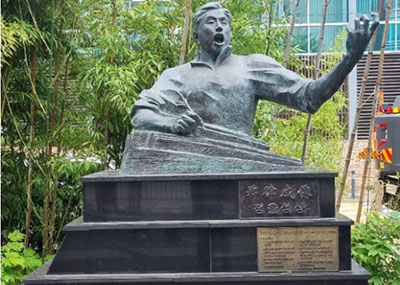by WorldTribune Staff, September 15, 2023
While in the U.S. communists were toppling statues of American heroes nationwide, South Korea’s pro-North leftists were erecting statues of communists.
The City of Gwangju in South Jeolla Province “has been paying tribute to a communist, Zheng Lucheng, who was loyal to the communist parties in both China and North Korea, especially the Chinese Communist Party (CCP),” Tara O noted in a Sept. 13 analysis for East Asia Research Center.

South Jeolla Province already boasts a street, a statue, and a museum idolizing Zheng. The City of Gwangju held a Zheng Lucheng music festival at taxpayer expense.
“Now they want to build a park in Gwangju to idolize him,” Tara O noted.
Another controversial communist figure whose bust is featured at the Korean Military Academy was Hong Beom-Do. The leftist Moon regime also set up that honor. South Korea’s Defense Ministry decided to remove it from the Academy. Hong was known to carry a gun from Lenin while wearing a Red Army uniform also given by Lenin. Moon flew his body from Kazakhstan to Korea and buried him at the National Cemetery.
Communist Shin Young-Bok is enshrined in a calligraphy font on a large rock at the entrance of the South’s spy agency the NIS. It was also done under the Moon regime. It was removed after conservative President Yoon Suk-Yeol came into office.
As for Zheng Lucheng, it was during a 2017 visit to China that then-South Korean President Moon Jae-In praised the communist as a symbol of Korea-China friendship.
“That year, the Blue House aggressively tried to designate Zheng as a ‘Meritorious Person’ of the Republic of Korea (ROK), but given his unarguable background working against the ROK, it could not be approved,” Tara O noted. “However, the Moon Jae-In administration found other ways to idolize Zheng — a park project commemorating Zheng Lucheng at the cost of ₩4.8 billion ($4 million), all borne by the taxpayers, which it approved.”
Born in Gwangju in 1914, Zheng Lucheng / Jeong Yul-Sung (born as Jeong Bu-Eun) migrated to China, where he died in 1974. Considered in the top 100 heroes by the CCP, Zheng is buried in the Cemetery of Revolutionary Fighters in China. In 1939, he became a member of the CCP under Mao Zedong. Zheng composed the CCP’s People’s Liberation Army (PLA) song (when it was the 8th Route Army), “the March of the 8th Route Army.” He also composed a multitude of songs praising Mao and the CCP, and was considered a “revolutionary musician” in China.
When North Korea invaded South Korea, starting the Korean War in 1950, “Zheng went back to China, but returned to Korea in October that year with the Chinese communist forces (the so-called Chinese Volunteer Army) to help North Korea and to boost the morale of the communist forces of both China and North Korea,” Tara O noted. “Before he returned to China in early 1951, he stole cultural assets, including Joseon Dynasty sheet music and other relics related to the Joseon royal family.”
Opposition has risen to the park project dedicated to Zheng in Gwangju.
Park Min-Shik, the Minister of Patriots and Veterans Affairs, wants to “prevent a project that commemorates the enemies of the Republic of Korea,” and described Zheng as “the cheerleader who boosted the morale of the enemies who pointed guns and knives at us,” adding, “the resentment and blood of so many patriotic spirits who were killed by the communists has not yet cooled.”
The Honam Alternative Forum and the Gwangju branch of the National Alliance for the Defense of Students held a combined press conference on Aug. 28 at the Zheng Lucheng Road in Gwangju, stating they “oppose the creation of a park to commemorate Jeong Yul-Sung (Zheng Lucheng), the cheering captain for the North Korean army, which massacred our people.”
Despite the opposition, Gwangju Mayor Kang Ki-Jung is intent on moving forward with the park project, claiming it would bring in more Chinese tourists.
Tara O concluded: “One thing is clear: Zheng Lucheng did not participate in or support the establishment of the Republic of Korea, which is based on freedom; rather, his efforts were against it, and he supported Korea controlled by the communist party. So why do the Gwangju mayor, the Confucius Institute, and some other supporters want to commemorate him?”
In a LinkedIn debate on the issue, Tara O responded to skeptics by saying:
The big deal about this communist is that he devoted himself to CCP China and KWP North Korea, against South Korea. During the Korean War, he went to Seoul along with the Chinese troops on the side of China/North Korea against South Koreans and the UN troops. He wrote songs praising PLA, KPA, Mao. His efforts elevated the morale of the communist troops. Morale is intangible, but a major factor in warfighting capability.
As a Propaganda chief in KWP, his campaign tricked the peasants into thinking they were getting free land, when it was not–it was the state’s confiscation of the land, but it was one of the major projects that turned the northern half into a socialist satellite of the Soviet Union.
He was married to Zhou Enlai’s god-daughter, indicating his senior status within the CCP. He’s considered 1 of top 100 CCP heroes.
And the various projects to idolize him were paid by South Korean taxpayers, with many of them unaware, until recently. Minister of Patriots and Veteran’s Affairs oppose this as well. Now Moon Jae-in is suing Minister Park for defamation.
There’s a reason why the Confucius Institute is promoting this .….
“It’s about rewriting the history to change the projectory of the future.”
Please Support Real Journalism
Hello! . . . . Intelligence . . . . Publish
